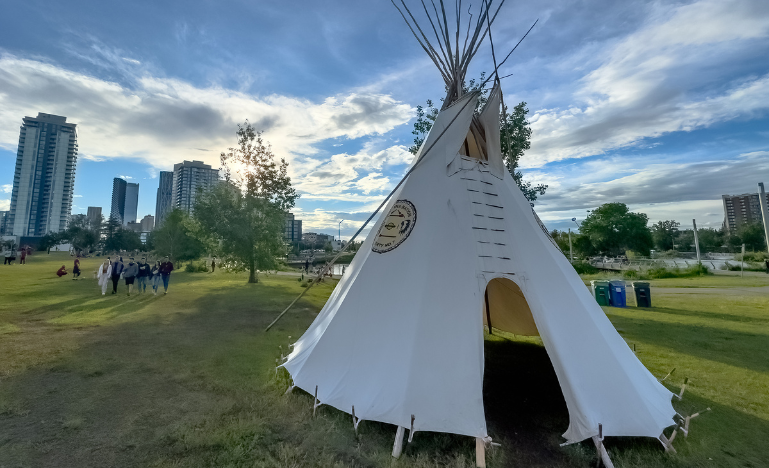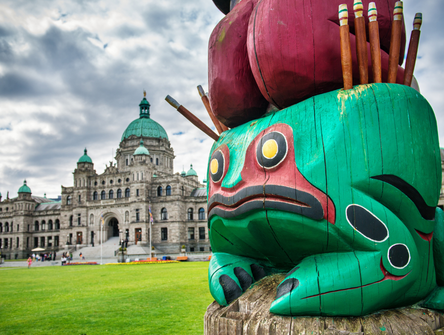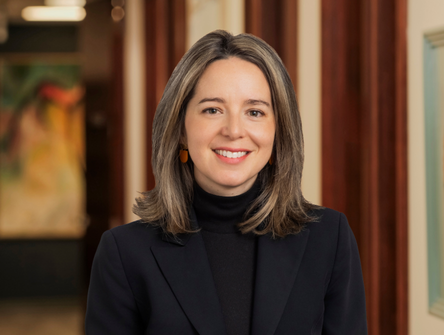Playing with political fire
Legal experts say even a vote on Alberta separation is a non-starter without Treaty First Nation consent

Indigenous treaty rights expert Bruce McIvor warns any move to whip up separatist fervour in Alberta is playing with political fire.
“I don’t think it’s possible for Alberta to move ahead and even have a vote on separation without Treaty First Nation consent,” says McIvor, a senior partner at First Peoples Law LLP in Vancouver and a member of the Manitoba Métis Federation.
He believes Premier Danielle Smith is well aware of those legal moats.
Alberta is in a unique situation in that it entered Confederation in 1905 as a province well after Treaty 6, 7, and 8 were reached with the Crown, McIvor says. Those agreements cover vast swaths of land.
Therefore, the province is a “junior partner” at any negotiations table next to Treaty First Nations and the Crown, now represented by the federal government.
“When Alberta did gain control of its Crown natural resources in 1930 through the Natural Resources Transfer Act, again, that was done subject to existing treaties.”
The Supreme Court of Canada has been clear that those historic deals allowing for peaceful settlement are “active living agreements,” he says. “There’s a constitutional obligation to both respect them and to implement them going forward.
“These are vital to what we now call Canada.”
What’s more, a failed referendum process could have dire consequences.
“This is likely to stoke hatred, racism and animosity towards Indigenous people in Alberta. They will be seen as standing in the way, and that can lead to violence,” McIvor says.
“I think it’s very dangerous and it’s very reckless of the premier to be building up these unreasonable, illegal expectations.”
At issue is the Election Statutes Amendment Act, which Smith’s United Conservative government tabled on April 29, the day after Prime Minister Mark Carney led the federal Liberals to a fourth straight term in Ottawa.
The legislation, known as Bill 54, received royal assent on May 15. It overhauls several election laws and brings back corporate and union donations.
It also significantly lowers the bar for signatures required for a citizen-led referendum to 10 percent of people who voted in the last provincial election.
That’s down from the previous requirement of 10 percent of all registered voters for legislative and policy referendums, and 20 percent of registered voters in two-thirds of provincial ridings for constitutional questions.
Anyone pushing for a referendum will also have more time to gather those signatures – 120 days instead of 90.
The Alberta Prosperity Project is already working to exceed those targets in hopes of forcing a referendum later this year.
In May, the group proposed asking the question: “Do you agree that the province shall become a sovereign country and cease to be a province of Canada – Yes or No?”
New data released in early April from the non-profit Angus Reid Institute found that if the Liberals won another term, three in 10 Albertans would vote to leave Canada and form their own country or join the U.S.
Results were based on an online survey from March 20 to 24 among a random sample of 2,400 Canadian adults who are members of Angus Reid Forum. The sample has a margin of error of plus or minus two percentage points, 19 times out of 20.
Smith has repeatedly denied she’s appeasing a separatist base that believes Ottawa has stifled the oil and gas sector while denying fair fiscal transfers.
“My party doesn’t support that,” she told reporters in May when asked if she has a mandate to open the door to Alberta secession.
Smith said she would respect the referendum process, but has been “pretty clear that I do not support separatism, myself. I support a strong, sovereign Alberta within (a) united Canada, and that’s what I’ll keep working towards.”
She plans to push Carney for concessions in response to what she has described as growing frustrations in the province.
Smith has also said that any referendum question must respect treaties and cannot breach the constitutional rights of First Nations, Inuit, and Métis people.
An 11th-hour clause added to Bill 54 emphasized that point.
It did not ease fierce backlash from Treaty First Nation leaders.
In a joint statement, Sturgeon Lake Cree Nation Chief Sheldon Sunshine and Mikisew Cree First Nation Chief Billy-Joe Tuccaro said it “means nothing.” As they see it, Bill 54 was the equivalent of tossing “legislative grenades.”
“We have heard from many treaty people; we are united in our resistance. None of us will back down.”
Rebeca Macias Gimenez teaches constitutional law at the University of Alberta. She points to landmark Supreme Court of Canada decisions, such as R v. Marshall in 1999, which affirmed treaty rights, while R v. Sparrow in 1990 outlined criteria to assess if government breaches of Indigenous rights are justifiable.
“The duty to consult is a really strong doctrine that First Nations can use to challenge this initiative,” she says.
“Treaty 8 is the only treaty that actually has a recording of the negotiations, the commissioner’s report on behalf of Canada,” dating back to 1899.
“And they recorded that they promised on behalf of Canada that the ways of life of the First Nations would be maintained.”
Alberta can learn from the 1995 Quebec separation referendum, which the Grand Council of the Crees vehemently fought, says Robert Hamilton, who teaches Aboriginal law at the University of Calgary.
Council Grand Chief Matthew Coon Come led a special referendum that saw the Cree decisively vote to remain part of Canada as a distinct nation with constitutionally protected rights.
“Indigenous people need to be understood as partners,” Hamilton says. “Decisions can’t be made unilaterally.”
Even if enough Albertans vote to leave, the top court’s 1998 Reference re Secession of Quebec is clear that constitutional principles, including respect for treaties, must be considered while terms of separation are negotiated, he added.
Sara Mainville, managing partner of JFK Law LLP in Toronto, is a former chief of Couchiching First Nation in Treaty 3 territory in Ontario. Her expertise includes Crown-Indigenous relations and the United Nations Declaration on the Rights of Indigenous Peoples.
She recently helped draft a document by Treaty 3 communities in northwestern Ontario and Manitoba pledging full support for Treaty First Nations in Alberta.
“It’s interesting how Canadians forget their own history,” she says. “The economic wealth that’s created really was founded on these treaties – and Alberta’s wealth in particular.”
Indigenous people can relate to the “elbows up” reaction of Canadians to President Donald Trump’s hostile takeover rhetoric, Mainville says.
“We’ve been in the same situation.”
She says Treaty First Nations are “frustrated and disappointed” by the slow pace of turning numerous court victories into fairer deals.
“Governments aren’t upholding the honour of the Crown. There should be so much more happening on the economic front regarding resource revenue sharing.”
McIvor says it’s galling to hear Albertans gripe about federal overreach and tax grabs.
“It’s a bit rich for Alberta to complain about transfer payments, which you hear all the time, when the resources their province is built on are Indigenous resources, on Indigenous land, that Indigenous people aren’t fairly benefiting from themselves.”


